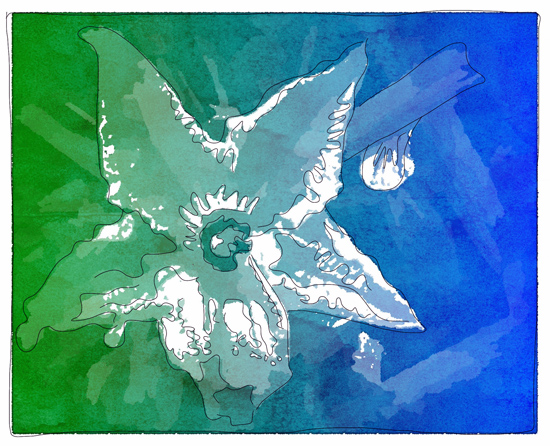
Summer squash blossom doodle, 2012
Rain stopped. Drought started. Sun soaked scorcher after scorcher. A heavenly week! Playing on Lake Champlain at last. And bracing for the return of rain tomorrow…
And so it goes.
Garden’s in a funny state. Corn, waist high, is already tasseled and covered in silky corn. Pigmies? Most plants stunted, endeavoring to recover from a month and a half of rain. Zucchini squash are still a week or so pre-blossom. Totally unusual for mid-July!
Summer play time with family has been a long anticipated treat, and ongoing preparations for another semi-solo storytelling show (Doodler’s Guide to Essex, NY) is in the final pages of prep. Much news, but it can wait. For now I’ll squash summer-so-far into a couple of timely publishing and doodling reads:
- Nobel Laureates Doodle Their Discoveries (Jenny Marder, July 5) What do you get when you ask 56 Nobel Laureate scientists to cartoon their greatest discoveries? Photographer Volker Steger fearlessly tackled the challenge during an annual meeting with Nobel Laureates in the Bavarian town of Lindau… (PBS NewsHour)
- Agency Dead? Penguin Ebooks Discounted (Jeremy Greenfield, July 12) Agency as we knew it is on its death bed. Penguin titles are now being discounted by retailers and the rest of Penguin Random House titles will soon follow. (Digital Book World)
- No Dog Days of Summer for Publishing this July (Jack W Perry, ) Typically July is one of the slowest months in book publishing… But this July has been full of major news and events and each will have a long-lasting effect on the industry… (Digital Book World)
Fascinating! All hats off to friend and Depot Theatre board colleague, Kim Reilly, for putting me onto this doodle news story. If you’re too sun-logy to read the full article, here are the gems.
What do you get when you ask 56 Nobel Laureate scientists to cartoon their greatest discoveries?
Photographer Volker Steger fearlessly tackled the challenge during an annual meeting with Nobel Laureates in the Bavarian town of Lindau. And what resulted was gritty, unpolished and playful — a far cry from the research itself.
When the scientists entered the room, they were greeted with a blank sheet of paper and a pile of crayons, and without warning, asked to illustrate their discoveries. “The resulting pictures show surprised people, who haven’t had time, really, to polish their pictures or burnish their reputations,” Hunt writes. “No aides or colleagues were on hand to help, no slides, no Powerpoint: these people had been ambushed!”
“Perhaps the public would prefer to invest them with a gravitas, a dignity befitting to their status, but in truth, most of these people had fun finding things out, and if this shows, it’s perhaps a good thing,” Hunt said. “It ought to help demystify the austere aura of scientists as priests of an arcane, impenetrable religion.” (PBS NewsHour)
The emphasis is mine. The reason should be obvious. And if not, I hope to see you at the Depot Theatre in Westport, NY on July 23 for further explanation.
My mind is obsesses with the storytelling potential for doodles. Especially quick, un-precious doodles. Doodling is discovery. And it just might be a fascinating way to crowdsource very abstract ideas in a universally accessible way. Or so I’m beginning to believe. Doodle experiment v1.0 is less than a week away. Then hoping to refine and retest in August and September/October at different venues. Drop me a line to share doodle advice, resources or secret sauce.
Related articles










